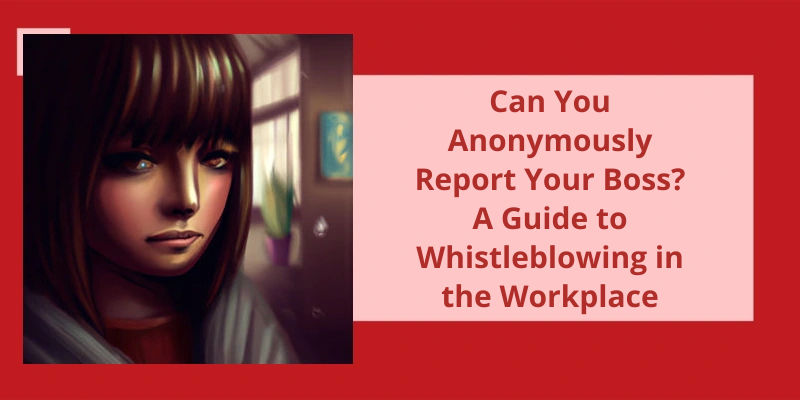As an employee, filing a complaint against your boss isn’t an easy task. There are several factors you need to consider before taking this step. For instance, the fear of retaliation, the possibility of losing your job, or the reputation damage that filing a complaint may cause. However, if you’re facing serious workplace safety or health hazards, you’ve the legal right to report your employer anonymously. This right is granted by the Occupational Safety and Health Act of 1970. The act not only allows employees to voice their concerns without fear of retribution, but it also empowers them to ensure their workplace is free of hazards and safe for themselves and their colleagues. In this article, we'll explore the ins and outs of anonymously reporting your boss and discuss what you need to know before taking this step.
Can I Anonymously Report My Boss to HR?
When it comes to reporting misconduct in the workplace, many employees may be hesitant to come forward. This can be due to fear of retaliation or simply feeling uncomfortable about speaking up. However, anonymous reporting is often available as an option for those who wish to report misconduct without revealing their identity.
Anonymous reports can be made to HR departments or other designated officials. These reports can cover a variety of workplace violations such as harassment, discrimination, or even illegal activity. The anonymity factor can provide a sense of safety for employees who may fear potential backlash from the accused individual or retaliation from others in the workplace.
While anonymity is allowed, HR officials are still obligated to investigate all claims of misconduct. This means that the individual being accused may be informed of the allegations and may have the opportunity to defend themselves. It’s also possible that during the investigation, the accuser’s identity may come to light despite efforts to keep it confidential.
If you’re considering making an anonymous report, it’s recommended to carefully document any evidence or instances of misconduct before coming forward. This can help support your claim and make the investigation process more efficient.
The Ethics of Anonymous Reporting in the Workplace
The ethics of anonymous reporting in the workplace refers to the question of whether it’s morally acceptable to conceal one’s identity while reporting an ethical or legal violation at the workplace. This practice is often employed by employees who fear retaliation from their employers or colleagues for “whistleblowing.” The issue remains a topic of debate among employers, employees, and legal experts.
While bringing up issues with your boss can be uncomfortable, it’s important to address concerns that are impacting your work environment. However, some employees may be hesitant to report issues due to fear of retaliation or other negative consequences. In these situations, anonymity can be helpful. There are multiple ways to make an anonymous report, but it’s important to weigh the potential benefits and drawbacks before choosing a method that works for you. Some companies may offer specific channels for anonymous reporting, while other employees may choose to leave an anonymous note for their boss.
How Can I Complain About My Boss Anonymously?
If you find yourself in a position where you need to complain about your boss, it’s important to consider the pros and cons of reporting anonymously. While it may feel comforting to know that no one will know it was you who made the complaint, there are potential downsides to taking this route. For one, it may be more difficult for your boss to take the complaint seriously if they don’t know who it came from.
However, if you do decide to report anonymously, there are a few different options available to you. Some companies have a silent witness online reporting form that you can use to file a complaint without revealing your name. This can be a good option if you want to provide detailed information without risking retaliation.
Another option is to use a 24-hour anonymous tip line that your company may have in place. This can be a good choice if you want to report something quickly and don’t have time to go through a more formal process. However, it’s important to keep in mind that these tip lines may not be as confidential as you think, and there may be a record of your call or message.
If you prefer to keep things low-key, you could try writing an unsigned note and slipping it under your managers door. Without any identifying information, it may be harder for your boss to understand the gravity of the situation and take appropriate action.
Regardless of how you choose to complain about your boss, it’s important to be aware of the potential consequences. If your boss does find out that you made the complaint, there may be repercussions, such as being ostracized by your coworkers or even losing your job. However, if you feel strongly about the issue and believe that reporting it’s the right thing to do, then it’s up to you to decide what risks youre willing to take.
The Legal Protections and Rights of Employees Who Make Anonymous Complaints
- The right to be protected from retaliation: Employees who make anonymous complaints have the legal right to be protected from any retaliation that may result from their whistleblowing. This includes protection from termination, demotion, harassment, or any other adverse action.
- The right to confidentiality: Anonymous complaints are usually kept confidential to protect the identity of the whistleblower. If an employer breaches the confidentiality agreement, they may be liable for legal action.
- The right to file a complaint anonymously: Employees have the right to file a complaint anonymously without revealing their identity.
- Protection against defamation: Employees who make anonymous complaints are protected by law against any form of defamation or false accusations.
- The right to due process: Employees who make anonymous complaints have the right to due process. This means that an investigation must be conducted to establish the facts and determine the appropriate action to take, if any.
Managing employee complaints is an inevitable part of running a workplace. While it’s always better to receive an upfront and honest complaint from an employee, sometimes it might come anonymously. But how do you respond to anonymous employee complaints? Here are some tips.
How Do You Respond to an Anonymous Employee Complaint?
Receiving an anonymous employee complaint can be a sensitive issue for any employer. It’s important to think carefully about the potential implications of being “on notice”, as once you become aware of a complaint, you’ve a legal responsibility to take steps to address the issue. Consider the nature of the complaint, and assess the risk it poses to the employee and your company. If the complaint appears to be serious, you may need to take swift action to prevent harm or damage to your reputation.
One way to mitigate the risk of anonymous complaints is by having a confidential employee reporting system in place. Ensure that employees know how to access the reporting system, and make it clear that reports will be taken seriously and kept confidential.
In some situations, it may be necessary to hire an investigator to look into the complaint. This can be particularly useful if the complaint is complex or involves multiple parties. An outside investigator can provide an objective assessment of the situation, and help you formulate an appropriate response. Be sure to hire an investigator with experience in workplace issues, and make sure they’re licensed and qualified to conduct workplace investigations.
Another option is to conduct a workplace climate survey to get a better understanding of the issues that may be contributing to the anonymous complaint. This can be a useful tool for identifying areas of concern and developing strategies to improve the overall work environment. Make sure the survey is anonymous to encourage honest feedback, and work with a qualified consultant or HR professional to design the survey and analyze the results.
Finally, it’s important to leave the door to HR open for all employees. Encourage employees to come forward with complaints or concerns, and make it clear that you’re committed to addressing these issues in a fair and reasonable manner. Provide training and resources to help employees understand their rights and responsibilities, and make it clear that you take a zero-tolerance approach to workplace harassment or discrimination.
Responding to an anonymous employee complaint requires sensitivity, careful consideration, and an appropriate response. By having a confidential reporting system in place, hiring an investigator if necessary, conducting a workplace survey, and leaving the door to HR open, you can show your employees that you take their concerns seriously and are committed to creating a safe and respectful work environment for all.
Source: 5 Tips for Handling Anonymous Complaints
As employees, we spend a significant amount of our time with our bosses. Unfortunately, not all bosses are good leaders, and some may even be toxic. It can be challenging to work in an environment where your boss’s behavior negatively impacts your mental health and productivity. In such scenarios, it’s crucial to speak up and take action, but when is the right time to escalate the matter to HR?
Should You Report a Toxic Boss to HR?
However, if your boss is toxic and creates a hostile work environment, it’s important to report them to HR to protect yourself and your coworkers. A toxic boss can create a toxic work culture that can affect employee morale, productivity, and mental health. It’s essential to address the situation before it becomes unbearable and causes irreparable damage.
HR exists to protect employees and ensure that the company operates in a safe and healthy environment. Your concerns will be taken seriously, and action will be taken to address the situation. HR will conduct an investigation, gather evidence, and if necessary, take disciplinary action against the boss.
When reporting a toxic boss to HR, it’s essential to bring concrete evidence of their behavior. This can be emails, text messages, or eyewitness accounts of their actions. It’s also crucial to document dates, times, and specifics of the incidents to provide a clear picture of the situation. HR needs to understand the context and severity of the situation to take appropriate action.
Unfortunately, sometimes reporting a toxic boss can lead to retaliation or negative consequences such as demotions, pay cuts, or termination. It’s important to be prepared for these possibilities and understand your rights as an employee. Many companies have policies in place to protect whistleblowers and ensure that employees aren’t retaliated against for reporting issues to HR. It’s also essential to have a support system in place, such as friends, family, or a therapist, to help navigate the situation.
It’s also important to be prepared for possible retaliation and have a support system in place.
Conclusion
In conclusion, reporting workplace safety and health hazards is a right extended to the employees under the Occupational Safety and Health Act of 1970. This Act provides protection and a safe working environment for the employees. Moreover, employees can file a complaint and request anonymity to avoid any potential backlash from their employers. It’s essential for employees to be aware of their rights, especially when it comes to their safety. Reporting anonymously can help create a safer and healthier work environment and is encouraged by the government and workplace safety experts. Remember, speaking up about unsafe workplace conditions can save lives and prevent injuries.






